'Poles apart' - Truro City embrace full-time move
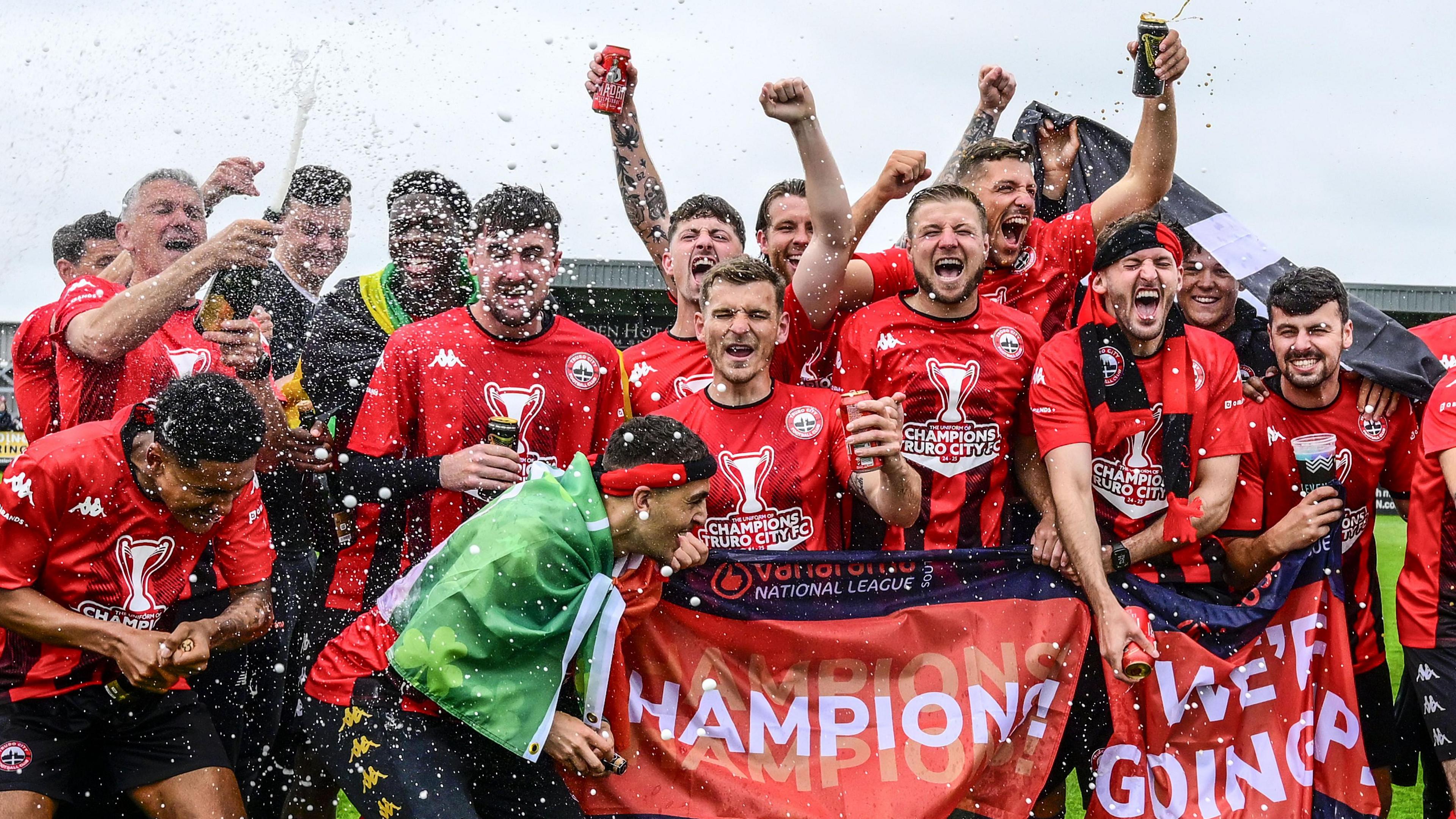
Truro City won the National League South title on goal difference at the end of April
- Published
"Certain opportunities only come along once in a lifetime," says Truro City manager John Askey on a sweltering summer lunchtime after training.
The former Port Vale, Macclesfield Town and York City boss guided Truro City to the National League South title last season.
The surprise package of the sixth tier had not been expecting promotion 12 months ago - they only moved into their new stadium at the start of last season when Askey took over.
But having won a nerve-wracking title race, Truro have gone up to the highest tier of non-league football and become fully professional - the first-ever team from Cornwall to do it.
"It's taken some getting used to," captain Connor Riley-Lowe tells BBC Sport.
A former young professional at Exeter City, he played alongside Wales and Leeds United's Ethan Ampadu and close friend and England star Ollie Watkins.
But that was the best part of a decade ago. Since then he has balanced part-time football at Truro with a full-time job as a teacher.
"It still feels a bit strange coming to football every day rather than going into work, but it's been lovely," he says.
"It's just been brilliant for me. It just allows you to be able to work a bit harder on the training ground."
Truro City win historic National League South title
- Published26 April
Truro City: From homeless club to league champions
- Published27 April
The Canadian owner out to follow Reynolds' lead
- Published17 December 2024
Riley-Lowe adds: "It's tough sometimes when you've worked a full day, left the house at seven, worked all day teaching, then after school club, and then get to training. Sometimes it's hard to be your best self.
"It just means that you can give a bit more on the training pitch and have a little bit more dedication to improving as a player."
But how difficult is it to give up a job that you have studied hard to get the qualifications for, and provides a regular solid income, to move to the notoriously fickle world of professional football?
"It was really tough. I changed my mind about four times," says the defender, who recently had another child with his partner.
"I worked hard to get in the position that I was in. I was very fortunate to be able to do both, but it was tough work. It wasn't easy.
"But I think the biggest thing for me, the school was so accommodating. I spoke to my head teacher straight away and just said, 'Look, this might be an option,' and she was just like, 'I don't even know what you're thinking here. You can do this until you're 70, but you can't go back and become a professional footballer again.'
"I've got a young family that I get to spend a lot more time with. The last two weeks alone I've dropped my lad off to to the childminder's and picked him up, and I never got that opportunity before."
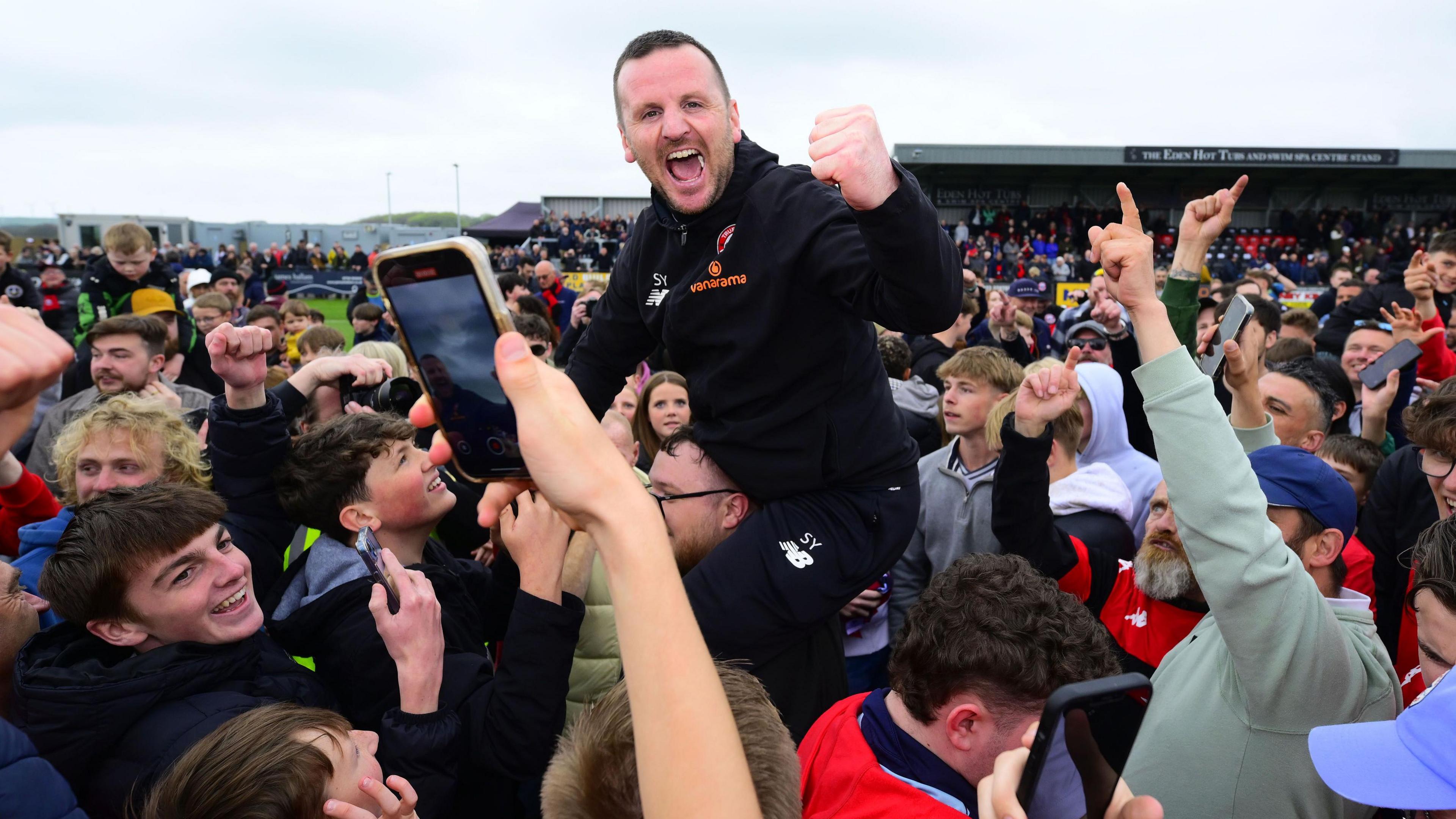
Truro City's assistant manager Stewart Yetton found out he was losing his day job soon after the club were promoted
For assistant manager Stewart Yetton the promotion came at the perfect time.
He has worked for the same firm as a mortgage administrator for more than 18 years - but shortly after Truro went up he found out he was being made redundant.
"It just kind of landed perfectly," says Yetton, who is also the club's record goalscorer.
"We won the league and then I found out I was getting made redundant. I think I was probably one of the first people ever who was celebrating that I'd just found out I'd lost my job.
"So a little bit bittersweet in that the rest of my team that I manage are unfortunately losing their jobs, but for me it just fell into place."
But the life of a professional footballer means lots of physical work - and for players used to training a couple of times a week the step up on the body can be huge.
"What you have to do is make sure you don't do too much too early, and ease them back into full-time training, and that's what we've done," says Askey.
"The big thing is trying not to pick up too many injuries through strains and pulls because you've done too much.
"It's easy to come in and keep pushing and keep pushing, but it defeats the object. The main thing is that it's the start of the season that people are fit for, they don't have to be fit in the first week of pre-season."
13,560 miles in 23 away games
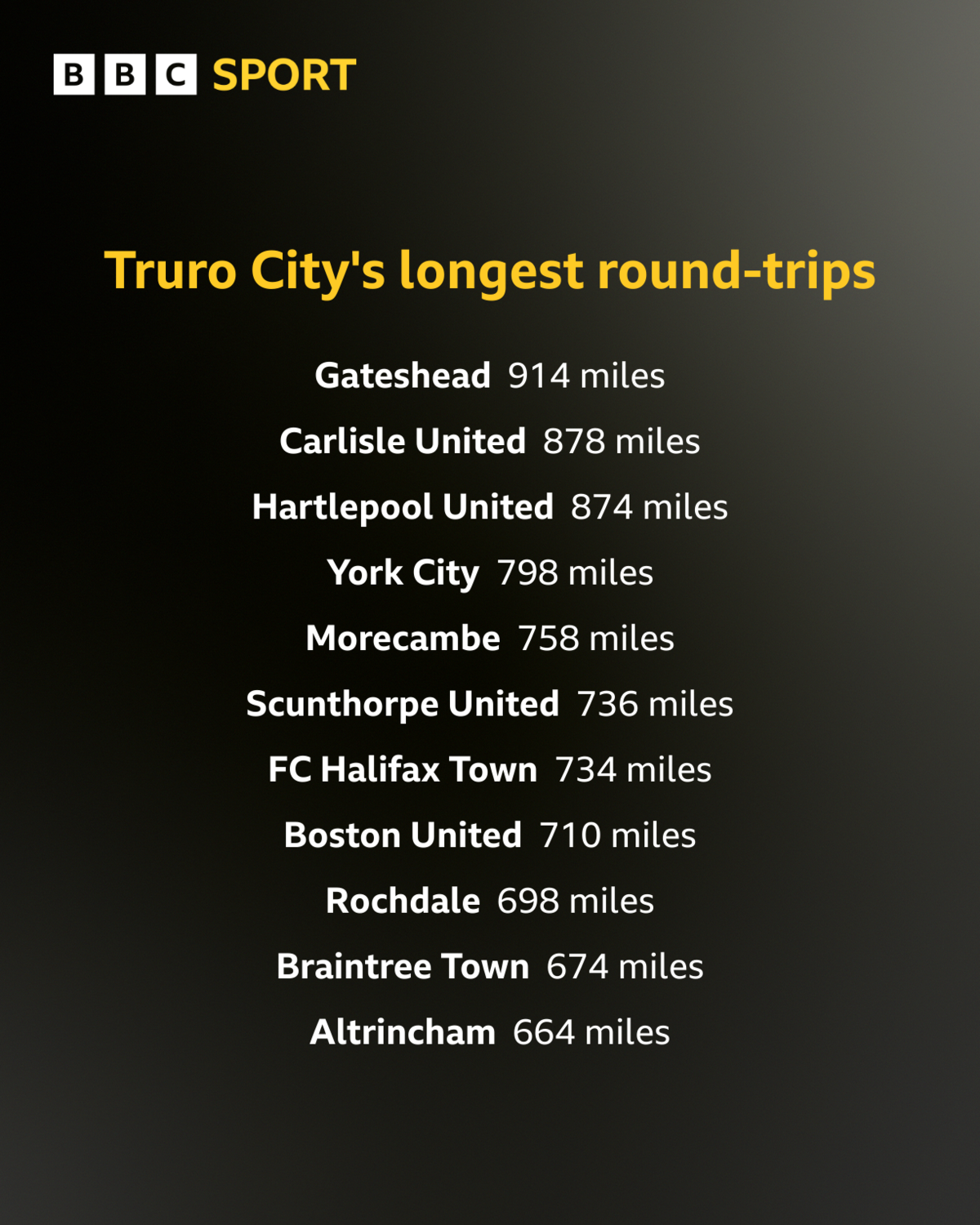
Truro's rise from local football to the National League has taken 18 years.
But their position on the Cornish peninsula means they are hugely isolated from the rest of the professional game.
Their nearest full-time team are League One side Plymouth Argyle - almost 60 miles away - whilst their closest opponents this season will be Yeovil Town - 140 miles and about three hours drive away.
No side in the history of English football will have had to travel as far as the Tinners will this season. In total, they will travel around 13,560 miles in the league, with their longest round-trip 914 miles to Gateshead and back at the end of October.
The club has seven away round-trips in excess of 700 miles, and more than half of their away trips are longer than the journey between London and Paris.
"No matter what league we've been in we've always had to do a decent amount of travelling," says Riley-Lowe.
"The club are very, very helpful in terms of like letting us stay overnight. We'll travel on the Friday, stay in the hotel on a Friday night.
"But since I've been at Truro, we've always been very good at home and I think that is obviously due to the traveling.
"It might be a little bit different this year. In previous seasons a lot of teams have done it on the day, and then that's where we're talking about - maybe teams not being able to be their best.
"I think every team in this league will come down the night before, so that's where it does level out a little bit."
But Yetton feels that being full-time will negate a lot of the problems the club had last season when they travelled.
"They [the players] were working until five o'clock, getting on the coach at six, getting to most hotels between 10 and 12 o'clock," he says.
"Now we've gone full-time, we'll be leaving at 10 in the morning. All right, there might be a few longer journeys, but we'll be getting there at a better time of the day.
"So I don't really think it will make much difference, purely on the basis we're not working 35, 37, 40-hour week jobs as well as football."
Askey aims to 'keep moving forward'
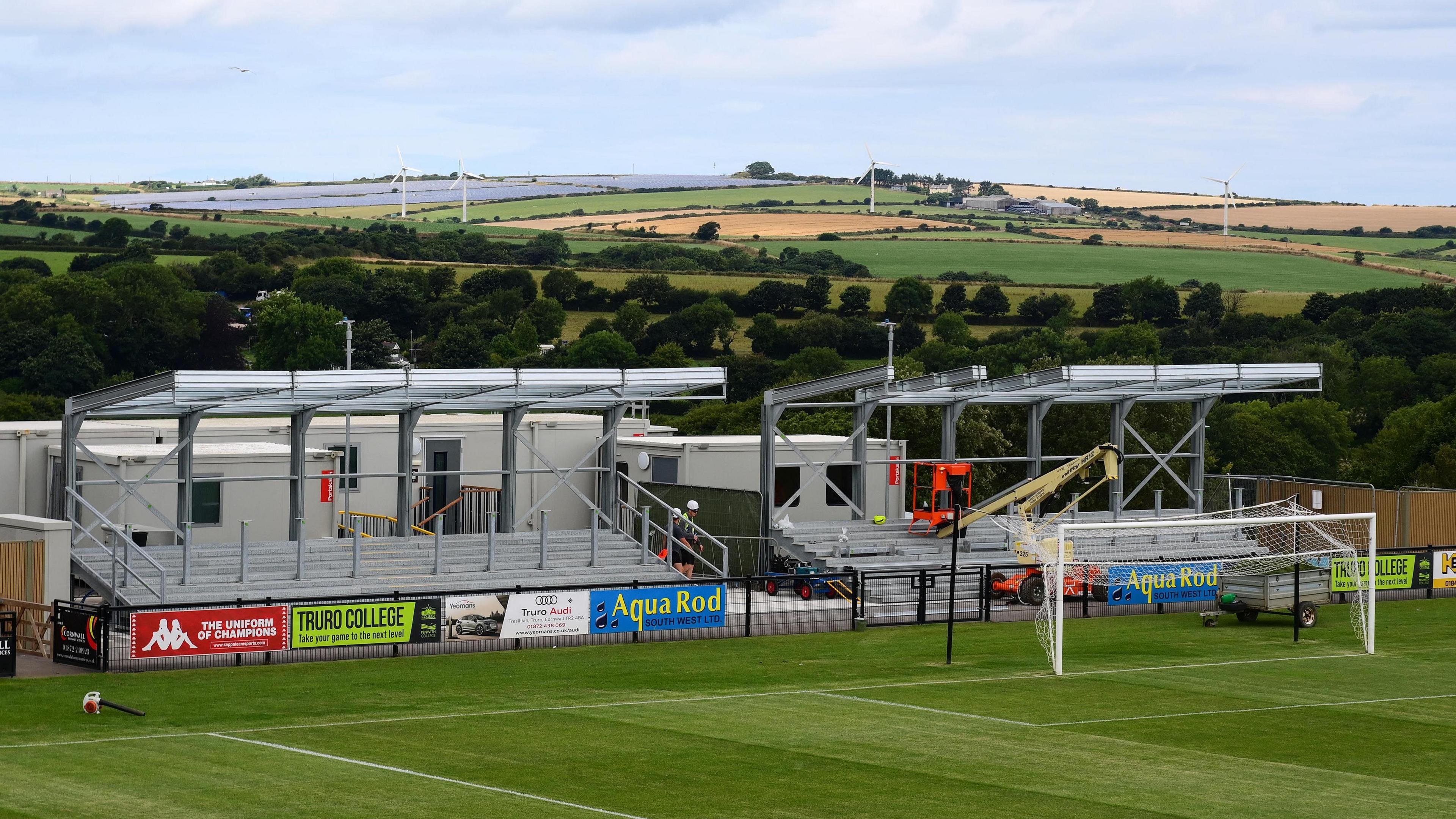
Work is well under way to improve Truro City's stadium in time for the start of the 2025-26 season
Truro's rise has been something of a rollercoaster.
Less than 20 years ago they were playing local league football in Cornwall, but when local property developer Kevin Heaney put his financial backing behind the club they shot up the leagues.
They won the FA Vase at Wembley in 2007, and reached what is now National League South in 2011 after four promotions in five years.
Financial problems followed, as did a period of homelessness after the club sold their ground to developers.
But for much of that time Yetton has been a constant, having moved to the club 20 years ago after being released by Plymouth Argyle.
"They'd offered me a contract which was three years and it was paid all year round - not massive money, but it was good enough and I was a young lad and it was a bit of security," he says.
"I took that jump, and that's where we started off playing against local Cornish sides.
"They had this dream of getting to the Football League in however many years. Did I think we'd get to the Football League? I thought it was a far, far stretch and we're still not there now.
"We got to the National League South equivalent when the money all dried up and they got relegated back into the Southern Premier League.
"But the club was able to sustain it through a couple of different ownership groups and we've kind of bounced around at that level.
"Last year was a bit of a freak of nature really - a new manager, quite a lot of new players, back to a new stadium, and from where we started off to where we are now are poles apart."
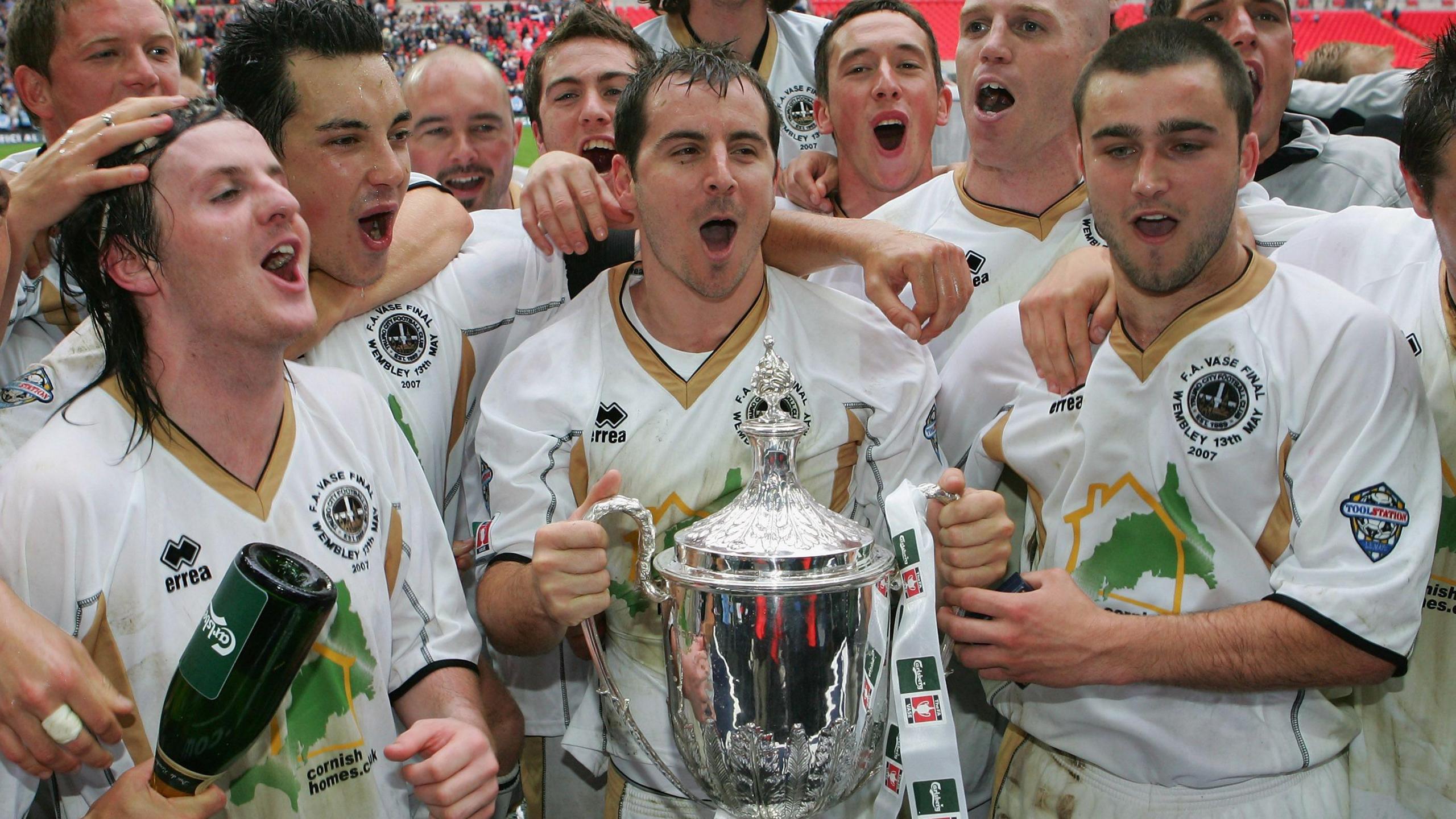
Stewart Yetton (left) helped Truro City win the FA Vase at Wembley in 2007
Truro's ground is undergoing a revamp to allow it to accommodate the extra fans - both home and away - expected this season.
But Askey says it is not just matchdays where the club - and their Canadian owners who took control in November 2023 - want to get better.
"We've come a long way in a short period of time," he says from the training ground in Plymouth the club uses and is run by Plymouth Argyle's Community Trust.
"You've only got to come here and see the training ground. It's better than what we had but it's nowhere near good enough for what we want really. We need better facilities.
"The whole club needs a complete overhaul really in its structure, but you can't do everything overnight.
"It's a bit like the ground - we can see the ground's developing and it'll be a lot better than it was last year, but it still needs to be better.
"And that's how we've gone with it. We keep trying to improve things and if you can keep doing that and keep improving then hopefully you keep moving forward."